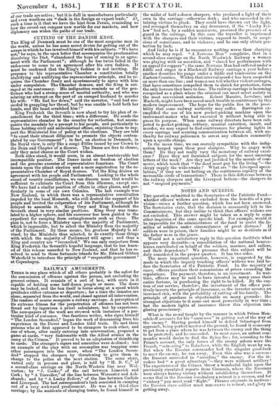CUTTING OF THE DANISH KNOT.
THE King of Denmark must be one of the most sanguine men in the world, unless he has some secret device for getting out of the serape in which he has involved himself with his subjects. " We have not,".he says, in the open letter that accompanies the proclamation dissolving the Diet, "abandoned the hope of coming to an agree- ment with the Parliament"; although he has twice failed in the endeavour to tome to an agreethent after his own fashion. It Must be confessed that the King's fashion is not inviting. He proposes to his representative Chamber a constitution totally stultifying and nullifying the-representative principle, and he re- quires the Chamber freely and -spontaneously to agree with him wider oompulsion. The Chamber demurs, and the King is out- raged at its contumacy-. His indignation reminds us of the gen- tleman who had a strong sense of marital authority, and who was relating an attempt on the part of an enraged husband to murder his wife. "He had her down," said the narrator, "and had suc- ceeded tn grappling her throat, but lie was unable to hold both her hands, and the beast scratched him ! "
King Frederick the Seventh is now about to try his plan of re- concilement for the third time; with a difference. He sends the representative chamber to the country for reelection, but accom- panies the mandate by a-precept to his people, and particularly to those holding-civil and ecclesiastical offices, enjoining them to sup- port the Ministerial line of- -policy at the elections. They are-told "lb exert their utmost diligenoe to promote the objects contem- plated by.our Government" ; in fact, an election in' Denmark, in the Royal view, is only'like a eonge d'elire issued by our Crown to the Dean and Chapter pf -e. diocese. The Donee are free to choose, only they must choose as the Court wishes.
Both sides stand, it would seem, in an almost irretrievable but incompatible position. The Danes insist on freedom of election and the genuine exercise of representative functions. The Court insists upon the pliant election and a mere registration by the re- presentative Chamber of Royal decrees. Yet the King desires an agreement with his people and Parliament. Looking to the whole round of courtly conciliations, we can discern none that would be sufficient to extricate the-Court from this dilemma, except one. We have had a similar position of affairs in other places, and par- ticularly in some of our own Colonies. The last example was New Zealand, in which there was a representative constitution impeded by the local Monarch, who still desired the support of his people and invited flie toOperation of his Parliament, although he delayed to assemble it. King Grey and King Frederick the Seventh stood in very similar-positions. King Grey was trans-
lated to a higher sphere, and his successor has been guided to the expedient far escaping from entanglements such as these. The plan is, not to force a Ministry upon the majority of Parliament, -which is impossible, but to select the 'Ministry from the majority of the Parliament. By these means, his gracious Majesty is ad- vised, by the Ministers thus selected, to do exactly those things with which the majority of Parliament will agree ; and thus a 'Xing and country are " reconciled." We can only conjecture from King Frederick the Seventh's hopeful language, that-he has learn- ed of 'this release accorded to New Zealand, and that he has re- volved to send to those fortunate islands for Mr. Edward Gibbon 'Wakefield to introduce the principle of "-responsible government" at Copenhagen.
























 Previous page
Previous page